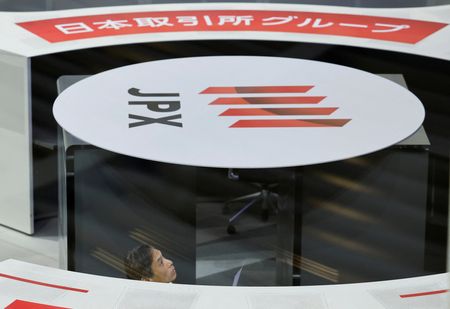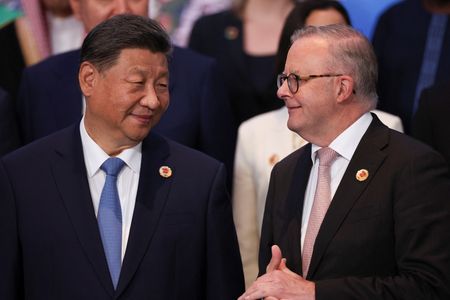By Jamie McGeever
(Reuters) – A look at the day ahead in Asian markets.
Asian markets are set for a rocky open on Monday following Wall Street’s selloff on Friday, as U.S. inflation concerns bubble up and global trade war fears intensify after President Donald Trump said he plans to announce reciprocal tariffs on many economies early this week.
Trump’s comments mark an escalation of his ‘America First’ offensive to reshape global trade relationships. There may be a reprieve, like there was with the Mexico and Canada tariffs recently, but if not, many Asian economies are vulnerable.
This will only deepen the nervous sentiment following the bruising day on Friday, where the big three U.S. indices lost 1% or more. Australian and Japanese stock futures are pointing to lower opens on Monday.
The negative tone is mostly down to Friday’s U.S. employment report which showed slowing job growth, but a fall in the unemployment rate and surprisingly strong wage growth. Rates traders are now fully pricing in only one Fed rate cut this year, and not until October.
The ‘risk off’ reaction shows inflationary pressures and the impact on interest rates weighed more on investors’ minds than any positivity from the strong growth signals. A closely-watched U.S. consumer inflation expectations survey on Friday was particularly strong too.
That said, the dollar and U.S. yields have been on a downward path in recent weeks, as a few key indicators have suggested U.S. growth may be slowing. That has loosened financial conditions, which has helped offset some of the tech- and earnings-related selling on Wall Street.
If inflationary pressures in the United States are bubbling up, they are pointing in the opposite direction in China – figures on Sunday showed that the battle against deflation is far from over.
Consumer price inflation rose 0.7% in January on a month-on-month basis, slightly slower than expected, and rose 0.5% annually, the highest since August. Producer prices fell at a 2.5% annual rate, however, a much faster decline than the -2.3% consensus view in a Reuters poll.
Annual producer inflation has been negative since October 2022. Little wonder Chinese government bond yields have slumped to their lowest on record.
It’s a completely different story in Japan, where bond yields and the currency are rising. The two-year government bond yield is the highest since 2008, and the yen has appreciated 5% in a month.
According to Goldman Sachs, financial conditions in Japan are now the tightest in five months, and if the latest signals from the Bank of Japan are to be believed, they are likely to get even tighter.
Financial conditions across emerging markets have loosened in recent weeks thanks to the fall in U.S. yields and the dollar. But not much, and tariff-related concerns loom large.
Here are key developments that could provide more direction to Asian markets on Monday:
– Taiwan’s TSMC monthly sales (January)
– Japan trade (December)
– Japan current account (December)
(By Jamie McGeever, editing by Diane Craft)









